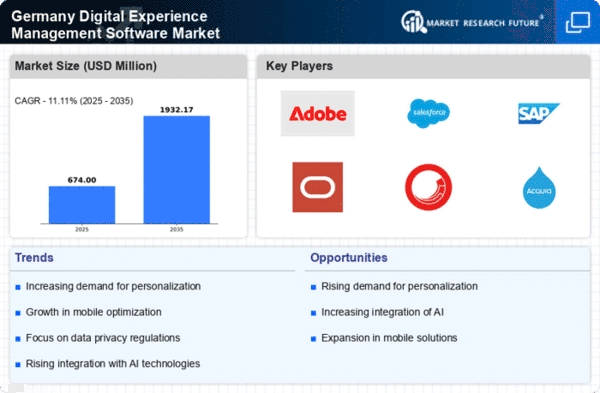Advancements in Cloud Technology
The digital experience-management-software market is significantly influenced by advancements in cloud technology. In Germany, businesses are increasingly adopting cloud-based solutions due to their scalability, flexibility, and cost-effectiveness. This shift allows organizations to deploy digital experience-management software more efficiently, reducing the need for extensive on-premises infrastructure. Reports suggest that the cloud services market in Germany is projected to grow by over 25% annually, which is likely to bolster the adoption of cloud-based digital experience-management solutions. As companies seek to enhance their digital capabilities, the integration of cloud technology will play a crucial role in shaping the market landscape.
Regulatory Compliance and Data Security Concerns
The digital experience-management-software market is increasingly shaped by regulatory compliance and data security concerns. In Germany, stringent data protection regulations, such as the General Data Protection Regulation (GDPR), are compelling businesses to adopt software solutions that ensure compliance while managing customer data effectively. Organizations are prioritizing tools that not only enhance user experience but also safeguard sensitive information. This focus on compliance is expected to drive market growth, as companies seek to mitigate risks associated with data breaches and non-compliance penalties. The emphasis on security features within digital experience-management software is likely to become a key differentiator in the market.
Growing Importance of Customer Feedback Mechanisms
In the digital experience-management-software market, the integration of robust customer feedback mechanisms is becoming increasingly vital. Companies in Germany are leveraging these tools to gather insights directly from users, enabling them to refine their products and services. This focus on feedback is indicative of a broader trend towards customer-centric business models. Research indicates that organizations that actively solicit and act on customer feedback can see improvements in customer satisfaction scores by as much as 30%. Consequently, the demand for software solutions that facilitate this process is expected to rise, further driving the market's expansion.
Rising Demand for Personalized Customer Experiences
The digital experience-management-software market is witnessing a notable increase in demand for personalized customer experiences. Businesses in Germany are increasingly recognizing the importance of tailoring their offerings to meet individual customer preferences. This trend is driven by the need to enhance customer satisfaction and loyalty, which are critical for maintaining competitive advantage. According to recent studies, companies that effectively utilize digital experience-management software can achieve up to 20% higher customer retention rates. As organizations strive to create more engaging and relevant interactions, the adoption of such software is likely to accelerate, thereby propelling growth in the market.
Increased Focus on Brand Consistency Across Channels
The digital experience-management-software market is experiencing a heightened focus on maintaining brand consistency across various channels. In Germany, businesses are recognizing that a cohesive brand presence is essential for building trust and credibility with consumers. This trend is prompting organizations to invest in software solutions that enable seamless integration of customer interactions across multiple platforms. Studies indicate that companies with consistent branding can achieve up to 23% higher revenue. As the demand for unified brand experiences grows, the digital experience-management software market is likely to benefit from increased investments in this area.

















